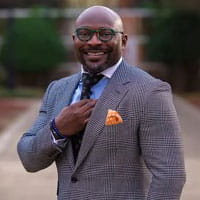Council on Peripheral Vascular Disease Featured Member
Dr. Foluso Fakorede, MD, 2023 Winner of AHA Louis B. Russell, Jr. Memorial Award
 If you had $ 1 billion to spend without restriction for PAD research/care/education, how would you allocate this for impact?
If you had $ 1 billion to spend without restriction for PAD research/care/education, how would you allocate this for impact?
Grant opportunities to recruit multidisciplinary team and researchers to medical/vascular deserts.
Create policies to recruit and increase underrepresented and disadvantaged students into cardiovascular training with goal to incentivize their long term clinical and research practices in their communities of racial-ethnic concordance.
Mandate all medical school curricula to change the name from PAD to leg artery disease and include associated risk factor health disparity education in high school to college curriculums.
Create a centralized database with patient reported PAD outcomes outlined by county and state levels. Hire community navigator designated to each county based on the proportionate gaps of resources and disparities. These community navigators would provide awareness materials, screening services, social determinants assistance programs at no cost sharing to the patients. This would also include transportation, medications, copays for visits/SET therapy/procedures, address nutrition counseling, food insecurity, and lead community engagement programs. This strategy would inherently tie social determinants of health into the care coordination algorithm and hopefully lead to sustainable community-based strategies that demonstrate impact with most recent real world data.
Create a PAD awareness campaign among all patients, providers and promote patient-centered PAD educational programs for all populations. Develop a PAD educational culturally sensitive campaign with significant celebrity and athletes to lend voices to support.
How did you get interested in PAD related care?
Unknown to many, I almost quit Cardiovascular Fellowship because PAD was my weakest cardiovascular subject and I didn’t understand the concept of combining lower extremity intricate anatomy with complex procedural strategy. I was overall lost and frustrated but I stayed the course thanks to encouragement from my mother. I was determined to apply myself in the PAD space outside of the hospital (attending weekend industry conferences), studying extra hours of lower extremity anatomy, shadowing PAD operators at a different hospital while maintaining that hyper focused attention to procedural equipment details.
During the continuum of my training, I learned about the racial cardiovascular health disparities in access to quality care driven by many factors rooted in structural racism, political determinants, lack of investment in communities of color, which limited access to resources and ultimately resulting in the poorest social determinants of health. Majority of these disparities, such as amputations, heart attacks, and strokes where located in the southern states that also happened to overlap the black censuscope of America. These “hot spots” or “heat maps” were also labeled medical deserts with very low number of cardiovascular specialists that were concordant with the plagued communities. This was a troubling pattern and I felt the need to act. The mission was to make the invisible visible, to be a common man working on behalf of a forgotten region when it comes to cardiovascular health equity and establish goals to reduce unnecessary amputations with an arsenal of equity.
I didn’t know how but I was intentional in my pursuits to make an underserved population my preferred site of service. God had a purpose for my life and he ultimately directed me (and my new found PAD passion) to one of the most challenging regions to work as a cardiovascular provider/limb salvage specialist here in the heart of the Mississippi delta.
What do you like to do outside of the hospital/clinics?
Other than spending quality time with family/loved ones, I love a good work out, watch all things sports, attend community engagement events, and love to travel.
